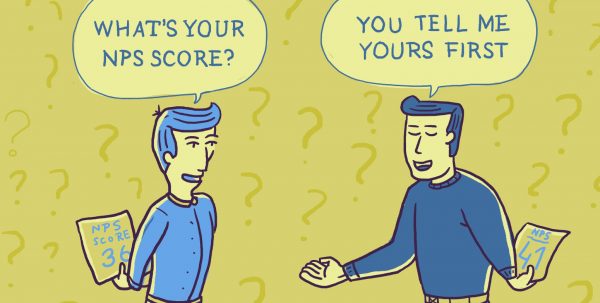Net Promoter Score®, or NPS, measures customer experience and predicts business growth. This proven metric transformed the business world and now provides the core measurement for customer experience management programs around the world. But we should do this instead of worrying about a good NPS score.
What should we do? I’ll get to that in a moment but first, some background.
According to NPS’s own website, respondents to NPS-based surveys are grouped as follows:
- Promoters (score 9-10) are loyal enthusiasts who will keep buying and refer others, fueling growth.
- Passives (score 7-8) are satisfied but unenthusiastic customers who are vulnerable to competitive offerings.
- Detractors (score 0-6) are unhappy customers who can damage your brand and impede growth through negative word-of-mouth.
Subtracting the percentage of Detractors from the percentage of Promoters yields the Net Promoter Score, which can range from a low of -100 (if every customer is a Detractor) to a high of 100 (if every customer is a Promoter).
But, this is where the score, and evaluation of your business, ends. You’re left with a score that is supposed to give you an accurate indication of how well your business is doing based on nothing more than how many customers are or aren’t “loyal” to your business and would give you a positive recommendation.
But what about those customers who gave a score of 7-8 and who aren’t even considered in the score calculations?
Do we know why they rated themselves neutral and in the range considered “passive”? No. Plus, I remember that getting a 70 or 80 on a test in school was passing and you got credit for it on your transcript. With a little more work, that 80 grade can easily turn into a 90 or more.
But in the world of NPS, it doesn’t count. Seems silly…
All we know is that the “passives” admitted they are not willing to shout your praises from the rooftops and be an unpaid advocate solely focused on telling everyone they know about how wonderful your business is. Frankly, who the heck does that anyway? Maybe your Mom, that’s it.
Now we’re left with the Detractors, those unhappy customers who may spread negative messages about your business whether it’s accurate or not.

Does a score of 0 -6 tell us why they were unhappy? Of course not. This is why the score is meaningless. It’s like getting a failing grade on a test and never told what the correct answer is. How then are we able to understand WHY we got it wrong and what we need to do to get it right the next time?
I am fully aware many industries use NPS as a main KPI, key performance indicator, and have done so for years. They firmly believe in its accuracy as a direct measure of customer experience. Others see value in using NPS as a tool in conjunction with other CS/CX measurements. That’s fine. But, if your tool is dull and doesn’t fit for the task at hand, what value does it really provide?
You see, I’m a practical person. I don’t like acronyms or catchphrases. I can do without all the fluff and feel-good terms many use to justify their position or keep with so-called industry metrics.
Most of my career has been in “operations”. I’m the guy who is on the floor, interacting with the customers and employees and finding ways to go above and beyond their expectations. My KPI’s are the smiles from the customers or the frustrations shown on the face of an employee. This is timely real-world feedback that’s addressed right now as it happens, not from a survey a few days or weeks after the fact.
Let’s stop focusing on what is a good NPS score is or how to calculate NPS. We should focus on why we got that score in the first place.
Instead of asking are you “likely to recommend?” and hope for a 9 or 10, we must drill down more and ask:
- “What did we do well?”
- “What can we improve upon?”
- “What actions did our employees take to show how much they appreciated your business?”
But no, we don’t do this. The customer surveys given, from where the NPS score is taken, are intentionally brief with only 2-3 questions being asked. The thought behind this is that a customer is more likely to respond to a survey that is brief and only takes 1-2 minutes to complete versus one with 8-10 questions. I understand the thinking behind that. But, without asking the questions that may give us actionable information on what we did well and what can be improved upon, how valuable are the answers? Not very, in my opinion. They don’t give us enough information.
We have to stop worrying about getting a good NPS score. We can do better. Get real answers to what’s working and what needs to be improved – then act on it.
We just need to be willing to ask the questions that matter.



